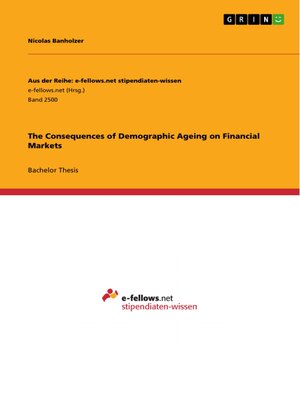
Sign up to save your library
With an OverDrive account, you can save your favorite libraries for at-a-glance information about availability. Find out more about OverDrive accounts.
Find this title in Libby, the library reading app by OverDrive.



Search for a digital library with this title
Title found at these libraries:
| Loading... |
Bachelor Thesis from the year 2012 in the subject Economics - Finance, grade: 1,3, University of Freiburg, language: English, abstract: Most developed countries will be going through a strong demographic transition over the coming decades. The large Baby Boomer cohort is approaching retirement and whereas it is often believed that they brought an economic dividend when they were working, it is assumed they will prove to be a drain on economic growth as they retire. Equally, financial markets are worried that the Baby Boomers will put the financial assets they accumulated over their life-cycle simultaneously on the market, thereby causing asset prices to tumble. However, looking at data about the life-cycle saving behaviour of households casts doubts that there is strong asset deccumulation even in the very old age. This work contributes on this issue by providing empirical evidence on individual stock market participation over the life-cycle in Germany between 2000 and 2011. The results give only weak support for strong asset deccumulation during retirement. In combination with the institutional design of the German pension system and other findings, demographic ageing is unlikely to lead to an asset price meltdown.






